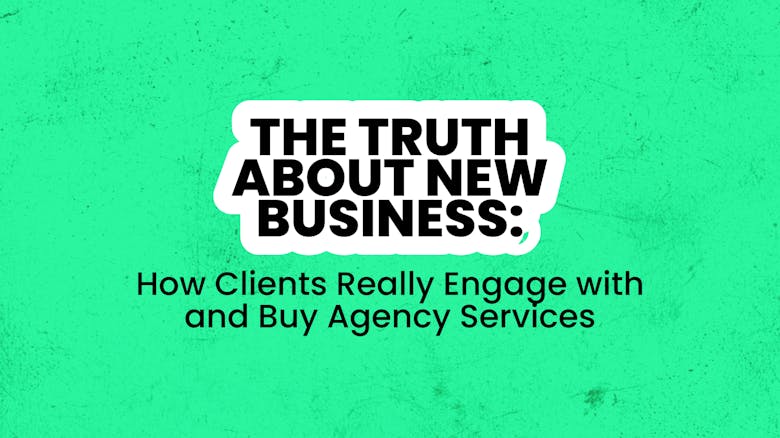A shifted Playing Field
The agency landscape has transformed. Budgets haven’t grown, yet expectations have - clients now demand deeper strategic input and greater ROI. The pool of agencies has grown, with specialisms and niche propositions making the agency selection process more overwhelming than ever.
In this environment, the ability to secure meetings hasn’t necessarily diminished - but converting those conversations into contracts has become significantly harder.
Engagement isn't the problem. Winning is.
Getting in front of potential clients isn’t impossible, but what happens next is the true challenge. Procurement teams and marketers alike are more discerning than ever. Whether due to economic pressures, tighter governance, or increased internal experimentation with AI and martech tools, agency relationships are more rigorously evaluated.
Strategic alignment, long-term thinking, and a clear sense of value are increasingly non-negotiable. Brands are looking for partners, not just suppliers.
The Power of Positioning and the 'Shop Window'
One of the most striking themes was the importance of an agency’s external brand. In a world where most client interactions start online, how an agency presents itself - through its website, LinkedIn, social channels, and even email outreach - plays a crucial role in whether it gets considered.
Generic messaging, outdated content, or unclear propositions can rule agencies out before a conversation even starts. Simplicity, clarity, and a strong USP were repeatedly cited as the most effective tools for standing out.
Cold Outreach Needs a Human Touch
Outreach remains a necessary part of the business development toolkit - but the way it’s done needs to evolve. Over-automated messages and boilerplate introductions are easy to spot and quick to ignore.
Successful outreach is timely, relevant, and personalized. It reflects a clear understanding of the recipient’s brand, values, or recent work. Thoughtfulness and authenticity - paired with brevity - are far more effective than long lists of services or agency credentials.
Pitching isn't broken, but behaviours must change
The pitch process is still alive and well, but expectations have shifted dramatically. Today, chemistry meetings often carry as much weight as final presentations. Many clients expect agencies to treat these early-stage meetings as critical moments to prove fit, show initiative, and bring forward strategic insight - often with no formal brief.
Behaviour during the pitch process is also under more scrutiny. Agencies that appear disorganized, pushy, or arrogant - no matter how strong their work - risk being ruled out. In contrast, thoughtful gestures, well-matched teams, and genuine passion for the client’s brand go a long way.
Live events and PR: Reinforcing the agency brand
Events were identified as a key tool for agency growth - especially smaller, curated gatherings that encourage genuine dialogue and connection. Roundtables, working breakfasts, and themed panels often outperform large-scale conferences when it comes to relationship building.
Alongside events, PR remains a powerful lever for visibility. Whether it’s announcing new wins, sharing thought leadership, or contributing to wider industry conversations, consistent media presence helps agencies stay top of mind and build credibility - particularly when resources are tight.
Awards: Useful, but not essential
Awards were seen as useful for credibility, particularly in disciplines like PR and performance marketing where outcomes are more easily measured. However, awards alone rarely win new business. They may help support an agency’s narrative or validate claims of effectiveness, but they’re typically considered supplementary to the human and strategic elements of a pitch.
Niche agencies and specialists on the rise
The demand for specialist agencies - particularly in areas like social media, influencer strategy, and digital activation is growing. Larger brands increasingly prefer a modular approach, partnering with experts in specific areas rather than relying solely on integrated agencies.
This shift creates opportunities for newer and smaller agencies to land initial projects and grow from there, provided they bring relevance, agility, and a clear proposition to the table.
Pitch fees, procurement, and the value of time
Discussion around pitch fees revealed a shared frustration: agencies are often expected to invest significant time and resources into speculative work with little formal recognition or compensation.
While pitch fees remain rare, especially in the UK, they are increasingly seen as a gesture of goodwill that signals a brand’s seriousness and respect for agency time. In some cases, agencies view this kind of remuneration not as payment for ideas, but as validation of a well-managed and intentional selection process.
Final thought: Chemistry still wins
More than any slide deck, portfolio, or case study, what still stands out most is people. Chemistry, the ability to connect, collaborate, and communicate, is consistently cited as the deciding factor.
Clients are investing in agency teams as much as they are in agency ideas. That means the people who pitch should be the people who deliver. It also means showing up with curiosity, energy, and the willingness to engage deeply - long before the pitch is won.
In a crowded market, it’s often not the loudest agency that wins, but the one that listens, understands, and cares the most.

